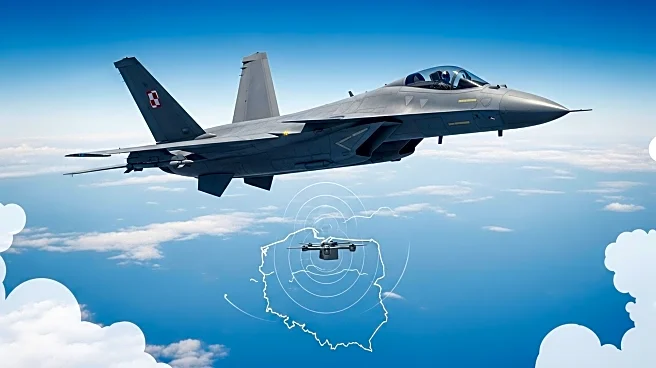What's Happening?
British fighter jets have participated in a NATO air defense mission over Poland in response to Russian drone incursions into Polish airspace. The RAF Typhoon jets were deployed on Friday night as part of NATO's Eastern Sentry operation, aimed at strengthening the alliance's eastern flank. This mission follows a series of Russian violations of NATO airspace, including drones detected over Romania and warplanes entering Estonia's airspace. The UK Ministry of Defence confirmed the operation, highlighting the commitment to defend NATO airspace. The mission was announced on September 10 after 19 drones were detected in Polish airspace, marking a significant escalation in regional tensions.
Why It's Important?
The deployment of RAF jets underscores NATO's resolve to protect member states' airspace amidst increasing Russian provocations. This operation is significant as it represents a direct engagement with Russian drones by a NATO member, highlighting the alliance's readiness to respond to threats. The incursions into Polish airspace are the most serious since Russia's full-scale invasion of Ukraine in 2022, raising concerns about potential escalation into open conflict. The mission reinforces NATO's collective defense strategy and signals to Russia that aggressive actions will be met with coordinated responses, impacting geopolitical stability in Eastern Europe.
What's Next?
NATO's response to the drone incursions may lead to further military deployments in Eastern Europe to deter Russian aggression. Poland's invocation of Article 4 allows for consultations among NATO members, potentially resulting in increased military support or strategic adjustments. The situation may prompt diplomatic efforts to de-escalate tensions, while NATO continues to monitor airspace violations closely. Stakeholders, including political leaders and defense agencies, will likely assess the effectiveness of current strategies and consider additional measures to ensure regional security.
Beyond the Headlines
The operation highlights the evolving nature of warfare, where drones play a significant role in modern military strategies. The incident raises ethical and legal questions about airspace sovereignty and the use of unmanned aerial vehicles in conflict zones. Long-term implications may include advancements in drone detection and defense technologies, as well as shifts in international policies regarding airspace violations and military engagements.











